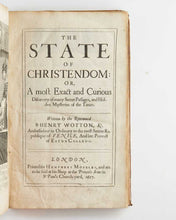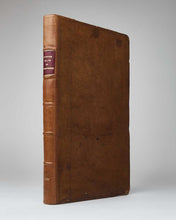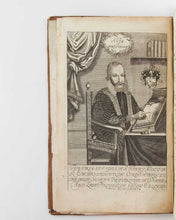WOTTON, Henry. The state of Christendom: or, A most exact and curious discovery of many secret passages, and hidden mysteries of the times. Written by the renowned Sr Henry Wotton, kt. Ambassadour in Ordinary to the most serene republique of Venice, and late provost of Eaton Colledg. London London: printed for Humphrey Moseley, and are to be sold at his shop at the Prince’s Arms in St Paul’s Church-yard. 1657.
Small folio. Contemporary speckled sheep, double fillet borders in blind, rebacked, red morocco lettering piece and gilt lettering to spine; pp. [20], 262, [2 (blank)], [2], 32, with engraved portrait of the author aged 72, woodcut initials, woodcut and typographic headpieces; bound without final blank, rear free endpaper renewed; extremities slightly worn, boards a little cuffed, two small abrasions to rear board; tiny wormholes and trails to inner margin of [*]1-Ee3 (not affecting text), to L3-ad finem (occasionally touching a few letters but not affecting legibility), and lower margin of Rr3-ad finem (far from printed surface), occasional mark; a very good, clean copy.
First edition of this ambitious, densely argued work, written in 1594 but unpublished until 1657, which may, in manuscript, have been instrumental in cementing the lifelong friendship between Wotton and John Donne.
The State of Christendom, written when the author was twenty-four years old, is cast as a report by an English Catholic abroad who, having “lived many years in voluntary exile and banishment” and witnessed “the malicious and hostile Attempts which the Spanish Monarch [Philip II] […] practised against my gracious Soveraign [Elizabeth], and invincible State and Kingdom […]”, begins “to despair of my long desired return into my native Countrey”. (Pearsall Smith offers a persuasive account of Wotton’s narrative ruse.) Meeting with “an honest and kind English Gentleman, […] lately come out of Italy, […] to sojourn a few moneths in France, […] then return into England”, the pair strike a deal. In return for an analysis of some pressing political and religious issues and their causes (redolent of Wotton’s own work for Essex), the Gentleman promises to “purchase [the fugitive’s] return home with credit and countenance.” Erudite and rhetorically elaborate, The State of Christendom purports to be the resulting text.
The work offers an overview of Europe’s turbulent political and religious past and the ongoing bloody conflicts between Catholic and Protestant powers. The dominance and danger of Spain and Philip II is a recurrent theme, while the plight of English Catholics abroad and need for religious toleration is implicit. England, under Elizabeth, is cast throughout as a model of Protestant moderation, unity, and strength. Wotton’s position will have appealed to his friend, John Donne, who, like many Elizabethans, balanced long-standing Catholic allegiances with loyalty to queen and state. A late-1590s letter from Donne to Wotton, confesses to having “almost condemned you of forgetting me but you are saved by your booke which I will keep till it pleaseth to dispose it otherwise.” The book in question, Dennis Flynn argues, was a manuscript copy of The State of Christendom.
The volume concludes with a supplementary justification of Antonio Pérez, former Spanish state secretary and protégé of the Earl of Essex (undertaken by Wotton at Essex’s request). Framed as a response to Pérez’s 1594 Pedaços de historia […] (gifted to Wotton by the author), it analyses the scandal that led to the Spaniard’s exile: the poisoning of Juan Escobedo on Philip II’s orders, his imprisonment by Philip, and escape into France, where he became a figurehead for anti-Spanish dissent. The supplement reinforces the work’s broader warning against tyranny, religious persecution, and unchecked royal power.
The timing of book’s publication in 1657, during Cromwell’s Protectorate (and another Anglo-Spanish conflict), is pertinent. Humphrey Mosely, its publisher, was known as a publisher of Royalist texts. Wotton’s patriotism, exaltation of the Virgin Queen, and religious tolerance may have chimed with the Royalist cause, but this unusual, semi-fictional, treatise is subtler than such binaries suggest.
See Logan Pearsall Smith, The Life and Letters of Sir Henry Wotton in Two Volumes (Oxford: Clarendon Press, 1907); Dennis Flynn, “Donne, Henry Wotton, and the Earl of Essex”, John Donne Journal, Vol. 14 (1995); Lisa Jardine and William Sherman, “Pragmatic readers: Knowledge transactions and scholarly services in late Elizabethan England”, in Gabriel Harvey and the History of Reading (London: UCL Press, 2024).
ESTC R21322, Wing W3654
#2123081






